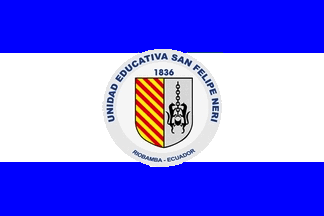 klaus-michael schneider
klaus-michael schneider
Keywords: ecuador |
Links: FOTW homepage | search | disclaimer and copyright | write us | mirrors

Last modified: 2021-08-26 by  klaus-michael schneider
klaus-michael schneider
Keywords: ecuador |
Links: FOTW homepage |
search |
disclaimer and copyright |
write us |
mirrors
 image by Ivan Sache, 20 September 2018
image by Ivan Sache, 20 September 2018
See also:
"Unidad Educadiva San Felipe Neri" (UESFN) was
founded at Riobamba by the Society of Jesus. On 13 October 1836,
President of the Republic Vicente Rocafuerte appointed Dr. J.
Véloz "Rector del Colegio Nacional de San Felipe
Neri"; however, the effective foundation date of the
institute is considered to be 25 April 1838. "Colegio San
Felipe Neri" was transformed into "Unidad Educadiva San
Felipe Neri" by the Ministry of Education on 21 September
2000 (Decree No. 931). The institute is named after St. Philip
Neri (1515-1595, canonized in 1622), an Italian priest and
mystic, founder of the Congregation of the Oratory in 1575.
Ivan Sache, 8 February 2009
A photo
taken during the "Proclamación de Abanderados y Escoltas
2008-2009" ceremony shows the flag of the institute as
horizontally divided blue-white-blue (1:2:1) with the emblem of
the institute in the middle, slightly overlapping on the blue
stripes. The flag is bordered with a fringe argent.
The emblem
of the institute was adopted on 21 September 2000, when the
institute was granted its current status and name. The emblem is
made of a shield vertically divided, the left half being yellow
with seven red bends and the right half being silver with a
cauldron flanked by two wolves, all in black. The shield is
surmounted by the foundation year, "1836", in blue, and
placed on a white disk surrounded by a grey ring charged with
"UNIDAD EDUCATIVA SAN FELIPE NERI" (top) and
"RIOBAMBA - ECUADOR" (bottom), in blue letters. The
shield is presented on the website of the institute as inspired
by the arms of Ignatius of Loyola, the founder of the Society of
Jesus. On the flag, there is a clear difference between the white
and silver elements, but the colour of the writing does not seem
to be blue, but rather or.
A similar coat of arms is used by the Society of Ex-Alumni of the
Colleges of the Society of Jesus, presented on the website of
"Colegio
San Ignacio de Loyola" of Piura, Peru. Ignatius de
Loyola was born Iñigo de Oñaz y Loyola, and his arms were
"Per pale, Oñaz and Loyola". The dexter part of the
shield, "Gules seven bends gules", was the coat of arms
of the Oñaz family. The seven bends were conferred by King
Alfonso XI of Castile to the seven Oñaz brothers who fought
during the battle of Beotivar in 1321, repelling, together with a
few Basque fellows, Gascon and Navarrian troops.
The sinister part of the shield, "Argent a cauldron flanked
by two wolves rampant, all sable", was the coat of arms of
the Loyola family. The wolves, symbols of ardor to war, are
canting for the name used by the saint in his youth, Iñigo
López de Loyola ("lobo" means "a wolf" in
Spanish). The cauldron may recall the affluence of the Loyola
family.
Ivan Sache, 8 February 2009